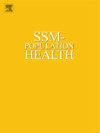晚年社会参与轨迹与认知功能——基于台湾老龄化纵向研究的序列分析
IF 3.1
2区 医学
Q1 PUBLIC, ENVIRONMENTAL & OCCUPATIONAL HEALTH
引用次数: 0
摘要
许多研究表明,更多的社会参与可以减少认知能力随着年龄的增长而下降。了解社会参与的转变如何与老年人的认知功能相关联是至关重要的。方法分析台湾老龄化纵向研究中老年(50 ~ 64岁,n = 1900)和老年(65岁以上,n = 2500)参与者的社会参与史。我们在1996年、1999年、2003年、2007年和2011年应用序列分析来定义聚集性社会参与和工作经历。2015年,我们应用线性回归模型分析聚类隶属度与认知功能之间的关系,并使用短便携式心理状态问卷(SPMSQ)进行测量。我们使用多项回归分析来探索与集群所属相关的因素。结果在中年人中,参与多种社会活动与较高的认知得分相关。老年人的工作和多种活动参与与更高的分数有关。研究发现,年龄较小的男性和非城市居民的社会参与模式更为积极。我们的研究结果支持社会参与和工作参与对健康认知衰老的价值。此外,我们还确定了更有可能参与社会活动的亚群体。本文章由计算机程序翻译,如有差异,请以英文原文为准。
Social participation trajectories in late life and cognitive functioning – A sequence analysis based on Taiwan Longitudinal Study on aging
Objective
Many studies have linked greater social participation to less cognitive decline with aging. Understanding of how social participation transitions can be associated with older adults’ cognitive function is crucial.
Methods
We analyzed histories of social participation among middle-aged (50–64 years, n = 1900) and older (65+ years, n = 2500) participants in the Taiwan Longitudinal Study on Aging. We applied sequence analysis to define clustered social participation and work history in 1996, 1999, 2003, 2007, and 2011. We applied linear regression models for the associations between cluster membership and cognitive function in 2015, measured with the Short Portable Mental Status Questionnaire (SPMSQ). We used multinomial regression analysis to explore the factors related to belonging to a cluster.
Results
In middle-aged adults, participation in multiple social activities was associated with higher cognition scores. Working and multiple activity participation among older adults were associated with higher scores. More active patterns of social participation were found for men, at younger ages, and among non-urban residents.
Discussion
Our study findings support the value of social engagement and work involvement for healthy cognitive aging. Additionally, we identified subgroups that were more likely to be socially engaged.
求助全文
通过发布文献求助,成功后即可免费获取论文全文。
去求助
来源期刊

Ssm-Population Health
PUBLIC, ENVIRONMENTAL & OCCUPATIONAL HEALTH-
CiteScore
6.50
自引率
2.10%
发文量
298
审稿时长
101 days
期刊介绍:
SSM - Population Health. The new online only, open access, peer reviewed journal in all areas relating Social Science research to population health. SSM - Population Health shares the same Editors-in Chief and general approach to manuscripts as its sister journal, Social Science & Medicine. The journal takes a broad approach to the field especially welcoming interdisciplinary papers from across the Social Sciences and allied areas. SSM - Population Health offers an alternative outlet for work which might not be considered, or is classed as ''out of scope'' elsewhere, and prioritizes fast peer review and publication to the benefit of authors and readers. The journal welcomes all types of paper from traditional primary research articles, replication studies, short communications, methodological studies, instrument validation, opinion pieces, literature reviews, etc. SSM - Population Health also offers the opportunity to publish special issues or sections to reflect current interest and research in topical or developing areas. The journal fully supports authors wanting to present their research in an innovative fashion though the use of multimedia formats.
 求助内容:
求助内容: 应助结果提醒方式:
应助结果提醒方式:


